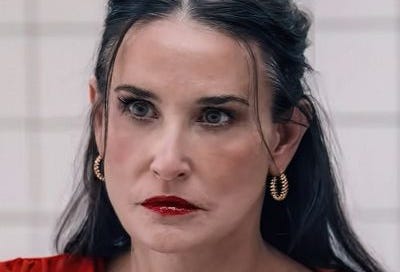Is "Real" Aging "Disgusting?"
It can be. But not how Millennials so afraid of it seem to think.
If you read The Cut voraciously like I do (and lots of Gen-Xers do) and you’re over 50, you may have processed some sharp words about aging in columnist Emily Gould’s recent review of the new Demi Moore film Substance entitled, “Real Aging Is Scarier Than Whatever’s Going On in The Substance.”
Photo: MUBI/Courtesy Everett Collection
When taken at face value, that clickbaity title is rather, let’s say, sensational, but the writer was actually pointing toward the choice of Moore in the lead role. I got that. But there’s more. Bear with me.
For context: I am an admitted fan of Emily Gould’s writing. We only know each other on X but from what I’ve gleaned, she’s in her early 40s (maybe technically the last heaving gasp of Gen X). She was an editor at Gawker and has built an incredible career as something of a literary shock jock. You know, those on-air personalities with the balls to blurt out all those verboten thoughts our executive functioning quadrants usually manage to contain. If you’ve read her body of work, you know she hasn’t a single qualm about laying her fears bare on the page. Her bravery and willingness to take a magnifying lens and beautifully describe the various discomforts of living is what makes her work so challenging and compelling. I even lauded a piece she wrote right here.
Back to it: Gould begins her review by applauding the visual and aural experience of the film, so designed to emphasize the terror that awaits for Moore. She then says the film uses maximalism and shock value to make its points, which is true yet ironic because these are the very tools she uses herself in the writing of this think piece.
Anyway, she stands incredulous at her inability to suspend disbelief long enough to buy Moore as a fading star:
“But the price of being thrilled by The Substance is accepting wholesale that a woman would be willing to give up her life seven days at a time to permit a version of her young, beautiful self to parade around in the world in her stead. The two selves don’t share a mind, so the old self must just sit around and watch TV while the new self paints the town. Why, I wondered, would anyone make that bargain? My inability to suspend my disbelief may be in part because Demi Moore, who plays faded star Elisabeth Sparkle, is one of the most beautiful 62-year-olds on the planet. If you’re already fairly perfect, why sacrifice everything to allow a glistening Margaret Qualley to burst forth from your spinal column?”
I get this. Moore is an eternal beauty, seemingly unchanged since the 80s and 90s. After many more decades, she’ll probably be lowered into the ground looking just as she is now. How could she ever feel as if she wasn’t enough? When you’re in your 40s, it’s almost impossible to imagine how looking as great as Moore does in 20 years could ever be a problem.
But women closer to Moore’s age understand why her looks really aren’t the point. This is why the conclusion of the piece left our mouths agape:
“The process of aging naturally is disgusting, this movie seems to be saying, and of course, the audience agrees. But pushing that cultural dictate to its most outlandish extremes seems, ultimately, superfluous, when the truth is already horrific enough.”
I don’t know about you but I was like, hold up, hold up, hold the FCK up: What is that horrific truth we’re purported to face on the daily, exactly? Because I’m much closer in age to Moore and am facing the punishments of time straight, no chaser, do I dissipate into the ether every time I emerge into the world?
As talented as she is, Gould is too young to really get it. How could she possibly be expected to interpret the myriad campy, satriric, anti-ageist nuances in that film if they don’t resonate with her lived experience? The casting of Moore in this role only further underlines the audacity of her character’s circumstance. The moral of the story is that aging isn’t horrific at all, but buying into male-perpetuated gendered ageism as a weaponized societal tool that robs us of our livelihoods, is.
The crux of the story is how we’ve managed to let the male gaze dictate and affect how we see ourselves as humans and at work, but Gould glides right over this vital little factoid. When you get to our age, we’re too busy grappling with the real indignities of aging, like hip replacements and heart monitors, to further perpetuate societal ageist bullshit because we know the more we buy into how disposable people perceive us to be, the more disposable we will, indeed, become.
To wit: Why wasn’t this review tasked to a writer closer to Moore’s age? Someone who knows full well how it feels to be prematurely aged out of gigs you’re perfectly qualified for and could speak fluently to how that movie spoke to the importance of pushing back? I, for one, would have deeply appreciated the opportunity to write or read that take.
All right. Rant over. Thanks for indulging me. Let me know what you think.
xx
MF




Well, you’ve got a platform here. Write it.
So well written! I was going to read that piece and now going to take this perspective in mind. 🙏🏼